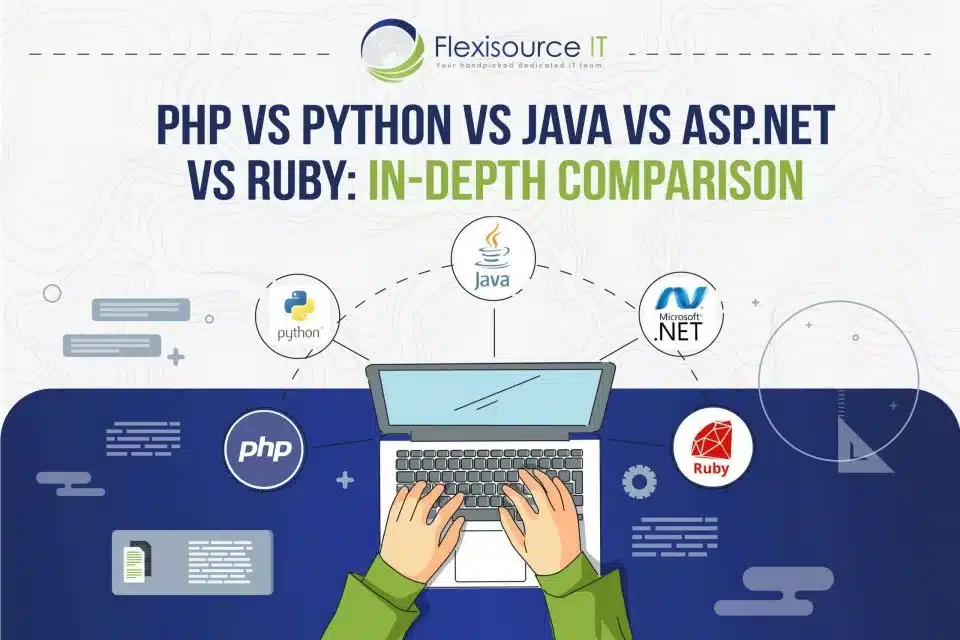PHP is a well-known open-source scripting language popular among web developers. It is considered an easy programming language to learn and master for people just starting to learn the program.
It was first developed in 1994 by Rasmus Lerdorf. The name came from Personal Home Page Tools, scripts used by Rasmus to track visits to his site. When PHP 3.0 was launched, the language got a reverse acronym: PHP: Hypertext Preprocessor.
Since its development in 1994, PHP has been a significant programming language. It is one of the most used languages for server-side scripting, mainly used for web development. This is primarily used for general purposes and ease of embedding into HTML source documents.
Is PHP dead?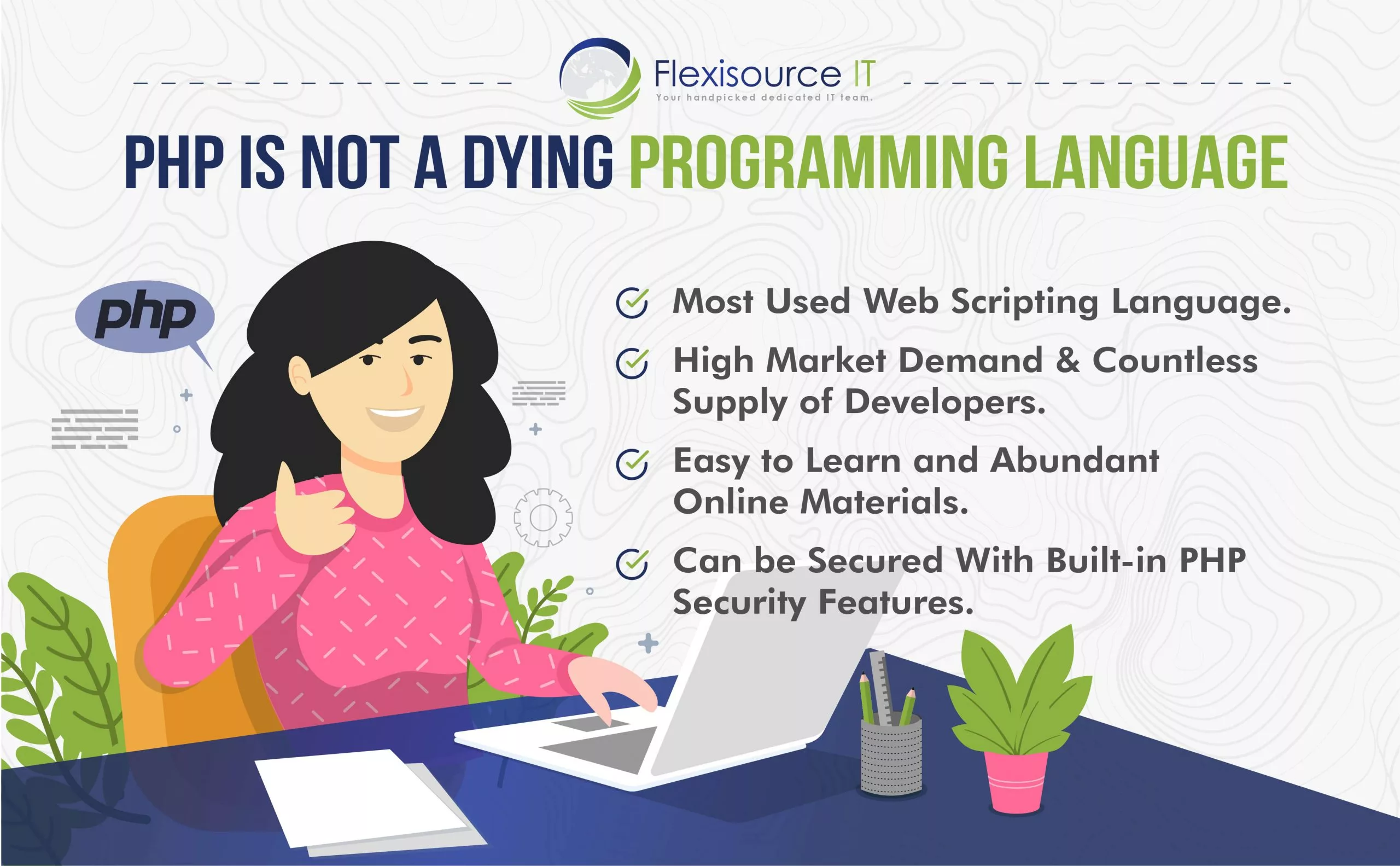
The majority of development websites worldwide are questioning if PHP is dying with the new languages popping. However, according to Johannes Rebhan, Head of Development at Koch Kommunikation, “PHP dying might also be a misconception. Node.js and JavaScript are all the hype at the moment.” Despite its basic form, most websites on the world wide web still use PHP as the back-end language. Popular websites like Facebook, Wikipedia, WordPress, and Pinterest all still use PHP.
However, with the new and upcoming programming languages being developed, some think PHP is dying. Let us look into available data to prove that it is not a dying language.
- Most Used Web Scripting Language
According to w3techs.com, PHP is still used by 79% of all websites whose server-side programming language we know. Since PHP is an open-source scripting language, many websites such as Facebook, Wikipedia, Tumblr, Slack, Etsy, WordPress still use PHP due to its easy-to-use nature, including embedded coding for HTML.
PHP is a popular open-source scripting language used for web development. Many websites use PHP, including Facebook, because of its easy-to-use nature, including embedded coding for HTML.
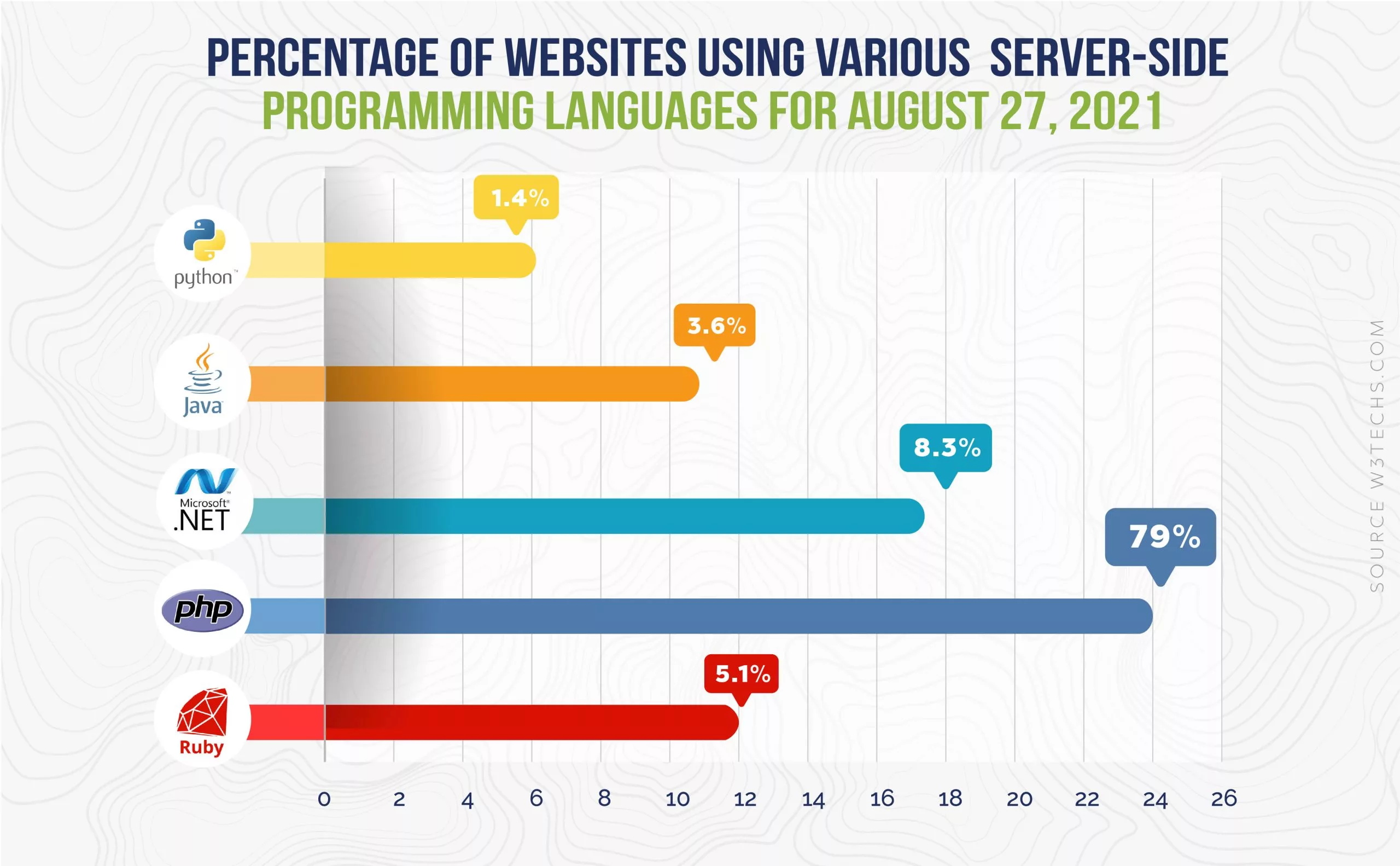 In addition, the language is maintained by a dynamic open-source community and can seamlessly work cross-platform across UNIX, Mac, and Windows.
In addition, the language is maintained by a dynamic open-source community and can seamlessly work cross-platform across UNIX, Mac, and Windows.
- High Market Demand & Countless Supply of Developers
The demand for PHP in some businesses offers longevity and the future of the language. PHP is a highly versatile language used by many business applications, from websites to CRM software to content management systems. It displays a high level of reliability and performance coupled with low deployment and maintenance costs. PHP is still used by major brands like Yahoo, Facebook, Wikipedia, WordPress, iStockPhoto, and more. It is used by approximately 79% of all websites (discounting CMS sites).
Similarly, according to The Register, there are 6.1 Million PHP Developers in 2019. This statistic is excellent because PHP is a comparably easy language to learn, and practitioners are often self-taught. It can be learned for free, has a vast community, and is open source.
- Easy to Learn and Abundant Online Materials
Learning PHP can be easy or challenging, depending on how it is approached when learning the language. Significantly, having a background in programming could be a great head start. Still, like other programming languages, PHP has rules of coding, abbreviations, and algorithms.
Next read this: Top Computer Languages, according to TIOBE Index
Since PHP is open source, there is an abundance of online materials available online. Several free reading materials and videos online are available that can help in learning this programming language. Information can also be found in several forums, as the programming community is very active and helpful in providing answers. Similarly, there are several detailed courses about PHP offered in university programs.
- Can be secured with built-in PHP security features
Since PHP is open-sourced, people can see the source code of the website. People could exploit any potential bugs or errors discovered in the source code. If the code is vulnerable, all applications or websites using it can also be susceptible. However, you can implement different web security practices to secure your application.
PHP vs. Other Web Scripting Languages: Which is Better?
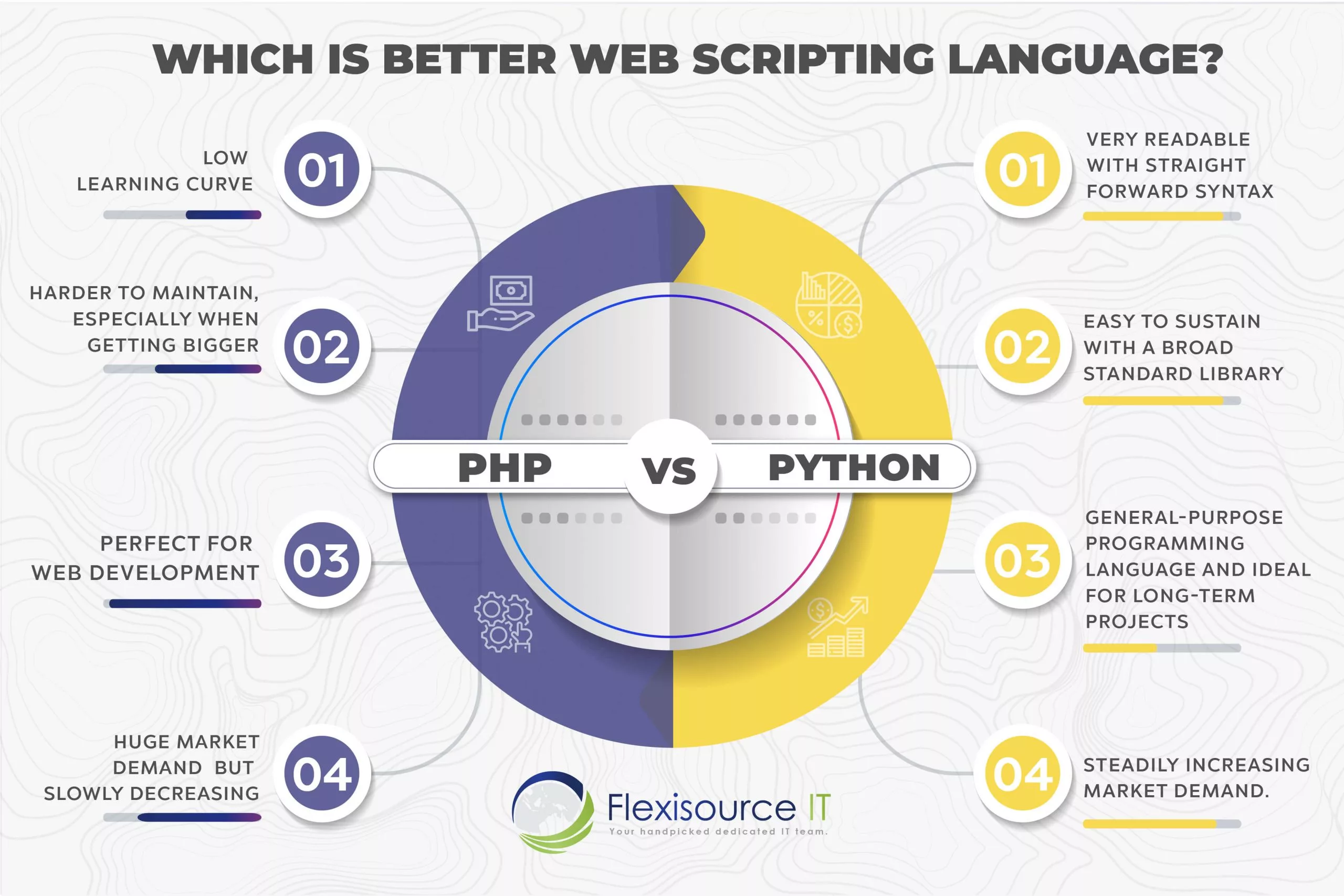 PHP vs Python
PHP vs Python
PHP is object-oriented programming, whereas Python is both object-oriented and procedure-oriented Programming.
Python is a general-purpose programming language but is also usually used for back-end web development. It is a high-level construed and object-oriented programming language with massive library support. It is generally used to develop standalone programs and scripting algorithms for various domains.
Generally, Python is powerful, portable, and fun to use. It has multiple features that other programming languages do not have. Its syntax is more straightforward, and the code is more readable than other programming languages like PHP. Python can have Rapid deployment and dynamic typing, with Less line no of code. Likewise, PHP is open-source and accessible deployment.
Similarly, PHP is general-purpose but is only used for back-end web development. PHP offers ease of use and robustness and is a server-side scripting language. It is used to create dynamic HTML, generating XML documents, flash animations, graphics, PDF files, and more.
Aside from that, PHP and Python can be differentiated with the following angles:
- Learnability – PHP has a low learning curve and is easier to get started learning with when it comes to learning. On the other hand, Python has a steep learning curve but is easy to understand with a steady learning curve. Python is very readable with straightforward syntax.
- Maintenance – Python is easy to maintain, having a broad standard library. PHP, on the other hand, is harder to maintain, especially when getting larger.
- Performance & Speed – PHP is perfect for web development programming language. Python, conversely, is a general-purpose programming language and is ideal for long-term projects. It is widely used in machine learning, data science, artificial intelligence, and automation tasks. For some time, Python has been faster than PHP. However, after the PHP 7 release, PHP has become 3x faster than Python.
- Cost – Both PHP and Python offer open-source licenses, making them freely usable and distributable even for commercial use.
- Market Demand – When it comes to demand, Python matches closely here with PHP. There are loads of Python developers in the market who are continuously developing Python applications. As a result, community support is outstanding. Python and PHP are both close here, with none of them being a clear winner.
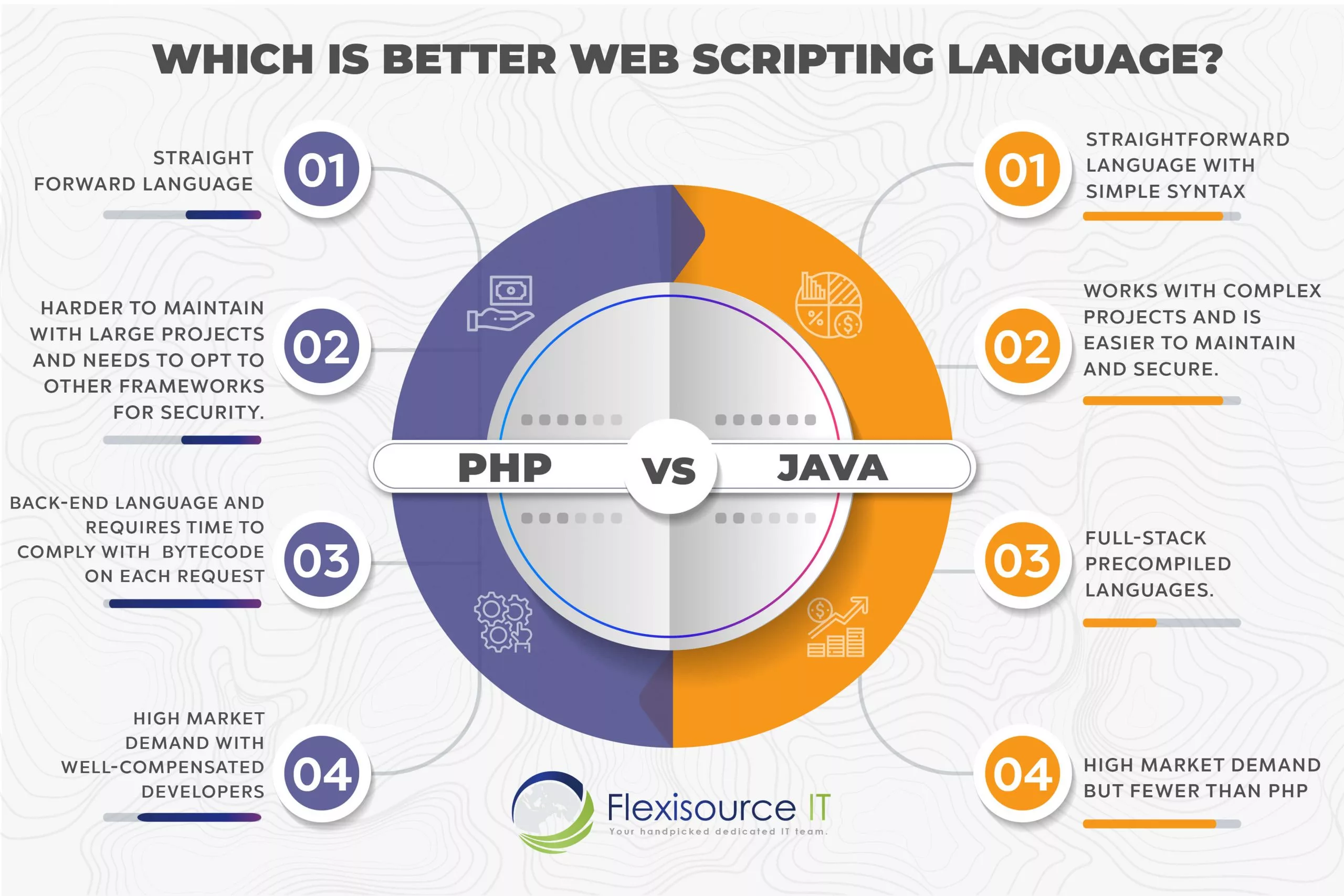 PHP vs Java
PHP vs Java
Java is a general-purpose, class-based, cross-platform programming language that has been around since 1995 after being introduced by Sun Microsystems. Like its slogan, “Write Once, Run Anywhere,” programs written in this language will operate on every platform that is compatible with Java, including computers and smartphones. Similarly, the following are the difference between PHP and Java:
- Learnability – Java and PHP are considered the most straightforward languages, depending on the developers’ previous knowledge and skills. Some believe that Java’s library is too deep. However, others pointed out that its syntax is much simpler than PHP and closer to English.
- Maintenance & Security – Java is considered easier to maintain and secure compared to PHP. It has added built-in security features, while PHP must opt for other frameworks. In the long run, Java works better for complex projects because it can block some features in low-level programming to protect the platform.
- Performance and Speed – PHP runs in the back end of a website. Java traditionally ran on the frontend, but that changed in 2009 when Node.js, a back-end runtime, was launched. Today JavaScript is truly a full-stack language. Java is precompiled for performance, and PHP requires time to comply with bytecode on each request.
- Cost – Like PHP, JAVA is available for free under an Open-source license for personal use. For production use, however, organizations need to pay.
- Market Demand – Both PHP and JavaScript developers are in high demand and well-compensated.
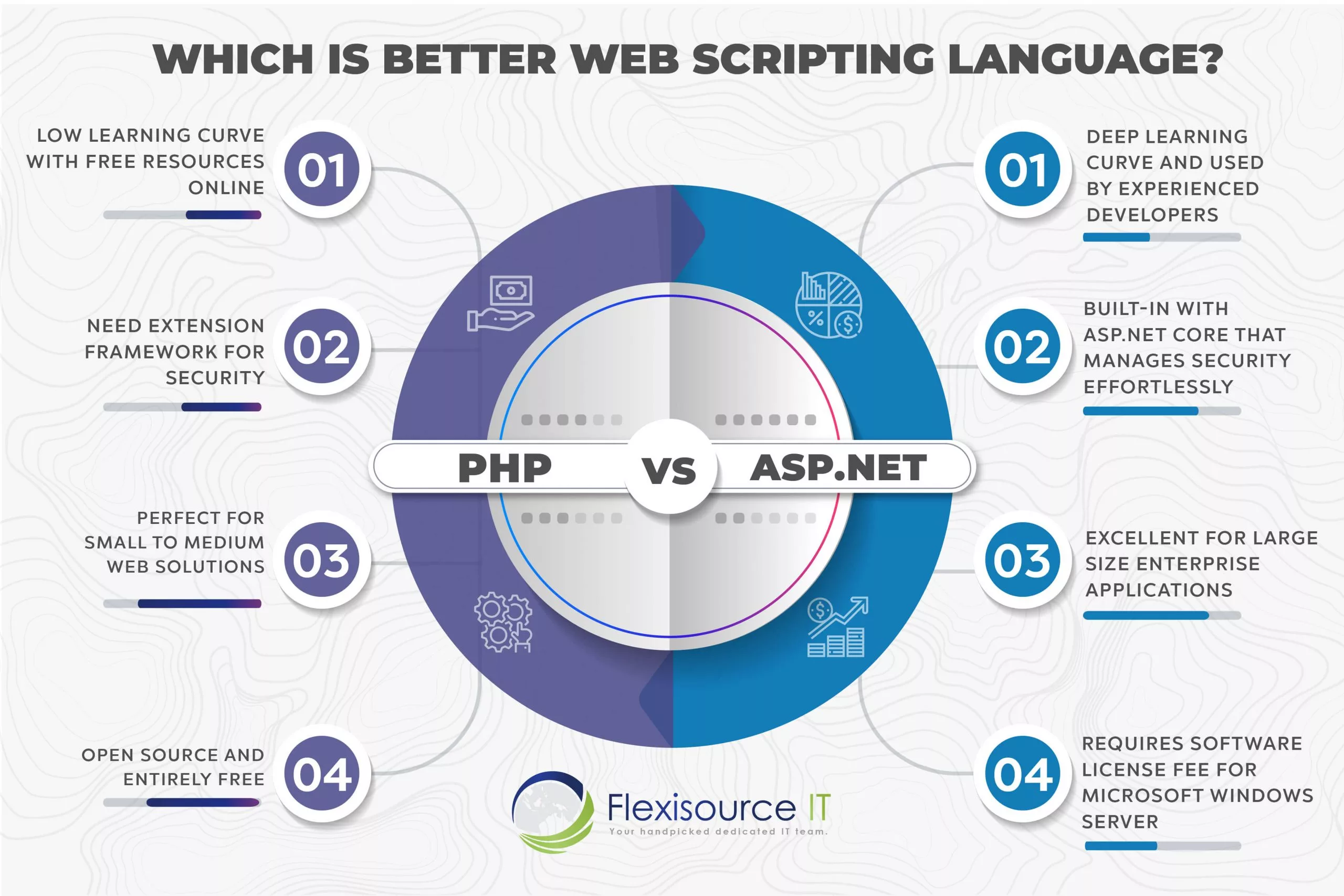 PHP vs Asp.net
PHP vs Asp.net
ASP.Net is a product from Active Server Pages by Microsoft and is commonly used for web application development. ASP.Net can be used for medium to large-sized enterprise applications, unlike PHP who can only be used for small to medium-sized web products.
- Learnability – PHP has a low learning curve and can be learned through online resources. On the other hand, ASP.Net has a deep learning curve that allows developers to create short web applications and pages using Visual Studios. Learning ASP.NET involves several factors such as HTML, Javascript, CSS are mandatory to develop and design a responsive and attractive web application.
- Maintenance and Security – ASP.NET Core enables developers to configure and manage security for apps effortlessly. It contains features authorization, authentication, data protection, HTTPS implementation, CORS management, and more. These security features enable the developer to build robust and yet secure apps.
Also Read: Simple Ways to Improve Employee Morale
- Performance and Speed – ASP.NET is excellent for medium to large size enterprise applications. It offers decent Speed, fast enough for desktop applications. PHP is perfect for small to medium-sized web solutions. It is typically not suitable and is slower for desktop applications.
- Cost – While PHP is entirely free, payment is required for software license fees for Microsoft’s Windows server for ASP.NET.
- Market Demand – In contrast, ASP.NET has a dedicated community with fewer developers, and PHP has a large size community since its open-source
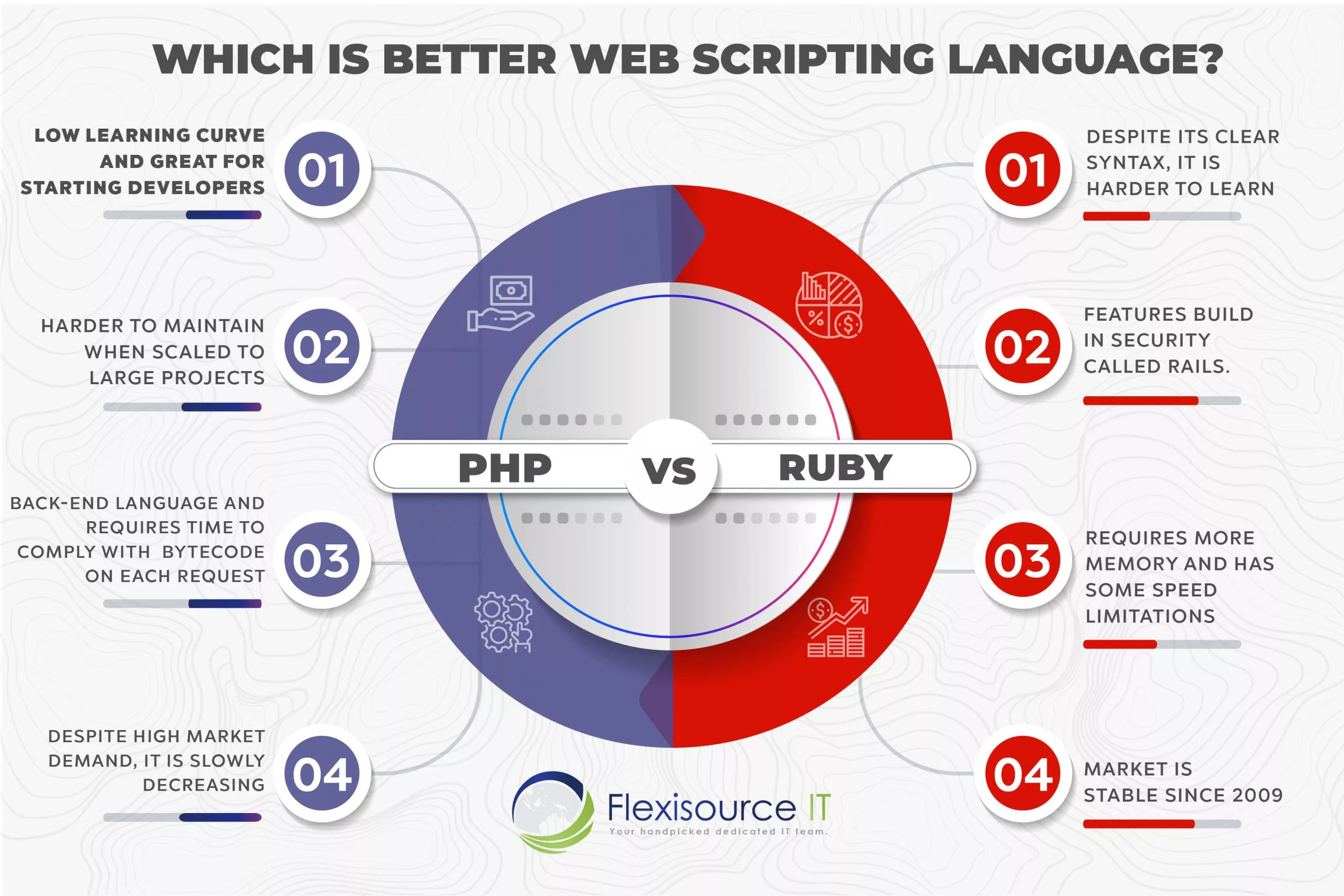 PHP vs Ruby
PHP vs Ruby
PHP & Ruby has been both the dominant programming languages used by developers. PHP is a scripting language commonly used for web development, while Ruby is a straightforward code written closely to English-like syntax. Throughout the world, PHP and Ruby are the most used programming languages used for Custom Web Development Services.
- Learnability – Despite its clear syntax, Ruby is harder to learn. Unlike PHP, Ruby is not a good starting point for new developers to remember. Usually, only seasoned developers know and use Ruby.
- Maintenance and Security – Ruby features rail security that is built and enabled by default. Utilizing rails assures a secure development lifecycle.
- Performance and Speed – PHP is much faster due to the language architecture, history, and, most notably, its philosophy. The majority of projects built with PHP are simple and do not consume memory. It is also easier to scale compared to Ruby. Small projects do not require over-the-top features. Ruby, on the other hand, requires more memory and has some speed limitations. This programming language concentrates more on significant projects that require customizable features.
- Cost – Both are open-sourced and free to use
- Market Demand – The demand for Ruby, by comparison, has remained stable since 2009. PHP is slowly decreasing because it is influenced by other back-end technologies like Node.js, Python, and Ruby.
Conclusion
It is important to remember that each language has its significant benefits. Always take a moment to analyze the project requirement and needs. In summary, PHP is still a relevant programming language used by many people to create different website applications. Like other languages, PHP has several flaws. Still, it is open-sourced, secure, and fast for developing web applications. Compared to other languages, PHP is still widely used and continuously being developed.
Still unsure? Check out the IT Services we offer.

